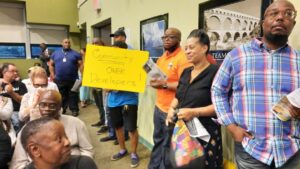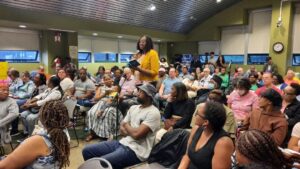It was standing room only at the Community Board 18 (CB18) office, at 1097 Bergen Avenue, where a hastily planned, last minute Special Meeting was called by the Department of City Planning (DCP) on Thursday, May 30th, to vote on the third and final proposal of Mayor Adams’ City of Yes initiative.
After a lengthy presentation by DCP on the City of Yes for Housing Opportunity, elected officials and/or their representatives, board members and members of the public had the opportunity to make a two-minute statement on the plan – and not one person had anything positive to say.
There is a housing shortage in NYC. If the City of Yes for Housing Opportunity is passed, a citywide text amendment would make it possible to build a “little bit more housing” in every neighborhood “by removing barriers to housing growth,” Kyra Cuevas, DCP’s Senior Borough Planner, explained.
The city is not building enough housing to meet New Yorkers’ needs. In addition, average household size is declining so more homes are needed, and the housing shortage is due to restrictive, outdated zoning rules that limit the number and types of homes that can be built, according to DCP.
Recent housing production has been concentrated in a few neighborhoods (only 10 community districts produced as much housing as the other 49 districts combined in 2023), putting pressure on the few neighborhoods that produce new housing.
Neighborhoods within CB18 (Canarsie, Bergen Beach, Flatlands, Georgetown, Marine Park, Mill Basin and Mill Island) are considered low-density, comprised of mainly one- and two-family homes. CB18 is one of the districts that has produced the least amount of housing since 2010, and residents want to keep it that way.
Cuevas said that a zoning text amendment will change zoning to allow for equitable housing development.
New zoning resolutions would allow ADUs (Accessory Dwelling Units) to be built on single-family and two-family lots. These secondary housing units, up to 800 square feet, can be added to a backyard, but ADUs can also include basements, cellars, attics and garage conversions, all which help to support multigenerational families.
“Town center zoning” would once again legalize residential units (up to four stories) above all commercial strips, and “Transit-Oriented Developments” (TODs) would allow three to five-story apartment buildings in low-density neighborhoods, on wide streets (75 feet or wider) or narrow streets on the corner, providing people with easier access to public transportation. TODs could be built within one-half a mile of a train station.
“Costly” parking mandates for all new housing would be eliminated from the plan. Parking would still be allowed, but it is “an obstacle to housing growth” and the “mandates drive up rents,” according to DCP.
The City of Yes for Housing Opportunity plan would also allow for small and shared apartments, providing low-cost options for young people and seniors, as well as the conversion of vacant office buildings (built after 1961) into housing.
While the wording of the plan, of which the full document is over 1,000 pages, may sound all well and good, CB18 residents want to preserve the unique character and suburban feel of their communities, and they made it loud and clear that they oppose the plan once the floor was opened to questions and comments.
Representing State Senator Kevin Parker, Michael Benjamin said the senator was against the City of Yes from Day One, and Jennifer Viechweg-Horsford, on behalf of State Senator Roxanne Persaud, said, “With environmental issues, high water table and sinking houses, we certainly cannot afford this proposal to be used here.”
Assemblywoman Jaime Williams is concerned how the plan would affect property values and questioned who the plan was really benefiting. “Are we doing this all for individuals illegally coming through the borders?”
She lifted the 1,000+ page document, exclaiming, “Can you raise what was given to you tonight? This is the real deal. Don’t let them fool you. Vote for our community. Once we lose it, it will be no more. Try to lift it; it is very heavy!”
Board members like Maria Garrett, who is also president of the Fresh Creek Civic Association, reflected back on Superstorm Sandy. “We still have homes sinking in Canarsie. DEP refused to come out because they said it’s the homeowners’ problem. So, if you build up these big apartment buildings, they are going to sink. We are overloaded already!”
Rob Mazzuchin, president of the Marine Park Community Association, believes the entire plan is propaganda and that the presentation uses selected terms like “modest amount of space” and “a little bit more” to try and get people to agree to the proposal that they are pushing. “We don’t want any of it,” he said.
Concerns were raised about additional development putting stress on existing infrastructure, to which DCP’s Director of Economic Development Carolyn Grossman Meagher responded that the agencies look at incremental effects and since the proposal is about adding a “little bit of housing” everywhere, “there is not an anticipated effect from an agency like DEP.”
To that, board member Jamaal Carryl said, “How can they handle additional capacity? How is that possible when they can’t seem to handle the concerns of the current residents already in the community? We have flooding, sinking ground, and they have been unresponsive!”
No one was happy about ending the parking mandate, with one person stating, “You are removing parking but adding more people to the community? I can’t even listen to this!”
“Why give away the one reliable transportation that we have in this area?” Carryl said. “We still can’t get stuff like the ferry that we asked for…we rely on our cars to get to places.”
Grossman Meagher explained that parking is not being taken away, just the mandates that required a certain amount of parking.
Other concerns included the loss of green space if additional developments, like ADUs, are added onto properties.
Councilwoman Mercedes Narcisse confirmed that she is in opposition to the City of Yes.
After a lengthy meeting, a vote was taken by the CB18 board, unanimously voting “No” to the “City of Yes for Housing Opportunity.”
All 59 community boards across the city must take a vote. There will be a public hearing in July. Then, the plan will go to the City Planning Commission for a vote, and finally, the City Council will vote.





